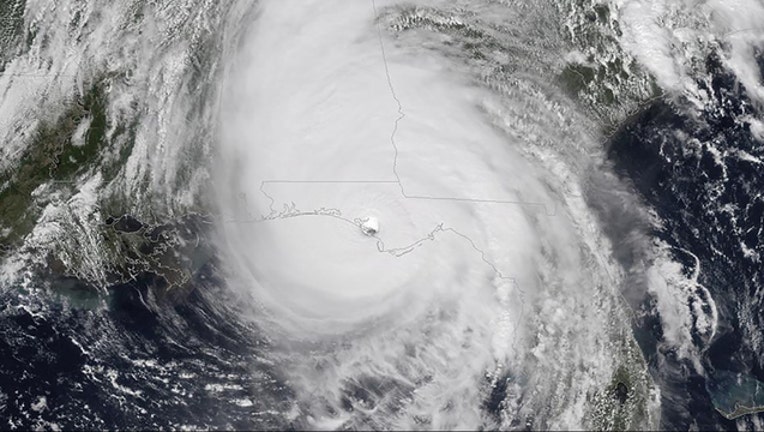Coronavirus and hurricane season: Here's why the Red Cross says now is the time to prepare

(NOAA)
ORLANDO, Fla. - With one month of the 2020 Atlantic hurricane season and four named storms already in the books, now is the time to prepare before the stormiest part of the season.
The American Red Cross is reminding Americans that preparation is different in 2020 during the coronavirus pandemic as COVID-19 cases surge in several states.
"Our physical presence may look different, but our missions remain the same," American Red Cross spokesperson Ben Williamson told Fox News on Monday.
Part of the physical differences regarding any big storms threatening the U.S. and triggering evacuations in the months ahead will be how storm shelters handle evacuees.
According to Williamson, the Red Cross is working to prioritize hotels, motels and dormitories for evacuees in order to maintain social distancing and isolate individuals as much as possible.
RELATED: NOAA predicts above-normal hurricane season for 2020 with 3 to 6 major hurricanes
Capacity changes to accommodate social distancing may limit the number of people allowed. Those arriving will have their temperatures taken and be screened using questions approved by the Centers for Disease Control and Prevention (CDC).
Anyone who does not have a mask will receive one when arriving at a shelter, and enhanced cleaning, sanitizing stations, and staggered meal times are planned, according to Williamson.
Isolation areas also will be set up in each shelter so anyone with COVID-19 symptoms won't be turned away. Officials also will take into account the elderly and those most vulnerable to the virus; they could possibly be placed in hotels or motels.
Throughout the country, each regional office of the organization is working with state and local partners to finalize plans.
"Everyone is going to have to adapt, change their preparations a bit," Williamson said.
The need to have a disaster plan in place seems to have greater importance because of the expected above-average hurricane season.
TRACK THE TROPICS: Visit the FOX 35 Orlando Hurricane Center for the latest in the tropics, including daily updates and weather alerts.
Two tropical storms in May and one in early June impacted the Gulf Coast, Southeast, and Midwest.
As 13 to 19 named storms are predicted during the Atlantic hurricane season, which runs from June 1 to Nov. 30, forecasters from the National Oceanic and Atmospheric Administration's (NOAA) Climate Prediction Center (CPC) said last month.
The season historically peaks from late August through early October, and Williamson said now is the perfect time to prepare for what may lie ahead with some simple steps.
1. Make a plan
Due to changes in shelters because of COVID-19, the Red Cross recommends creating an emergency plan or adjusting any previous plans.
"We're encouraged to have these conversations now, we need folks to plan," Williamson told Fox News.
On its website, the Red Cross offers templates with three steps.
With limited space, the Red Cross will not be able to accommodate pets in storm shelters this year. Service animals, however, are welcome; individuals must bring whatever they need for their animals.
MORE NEWS: Hurricanes growing stronger, more intense; climate change may be a factor, federal study says
Williamson said people should talk to family about where to go. With concerns over COVID-19, he said now is the time to discuss a person's comfort level for staying in a shelter, with friends or a hotel.
"Look at hotels in areas where you think you may be able to stay," he said, noting that rooms in certain areas may be harder to come by if those facilities are used to isolate people.
In light of the economic effects due to the pandemic and millions filing for unemployment benefits, the cost of evacuating may be on the minds of those in potential storm zones. Williamson said that shelters will be available and that listening to emergency officials is key to staying safe.
"We want to stress that if evacuations are ordered by state or federal officials, those are for your safety," he said. "We would ask that people follow those."
2. Make a kit
Officials typically recommend having enough food and water for three days as part of an emergency kit, as well as a one-month supply of prescriptions.
But that kit also should include face masks, gloves, hand sanitizers and disinfectant wipes.
As stores reopen in several states and more supplies are on the shelves, Williamson said that now is the time to keep an eye out at the store and grab those extra items to add to family disaster kits.
"Don't wait until a week before the storm, where there is an evacuation ordered, to do this," he said.
3. Staying connected
Once individuals have their emergency disaster plans and kits ready, Williamson encourages individuals to look and learn from local and state emergency departments.
"Hurricane season is a team effort across the country," he said.
The Red Cross also has a free Emergency App for weather alerts and for shelter during approaching storms.

